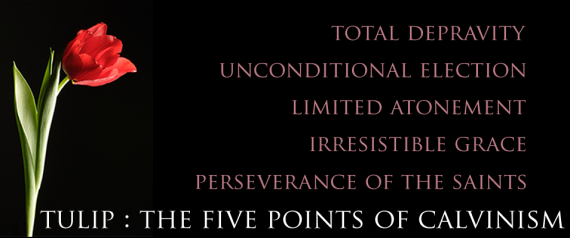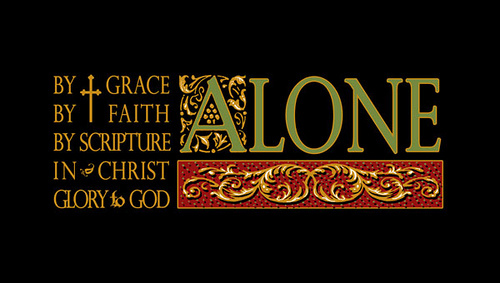
I am not really sure when I fully embraced Calvinism, but I do know that by the time I was in my early 20s, I was a five-point Calvinist.
Since Calvinism was so inherently logical and apparently biblical, I was fully persuaded in my own mind that “Calvinism is the Gospel, and the Gospel is Calvinism” (as some Calvinists claim). I vividly remember debating Calvinism with many of my non-Calvinist friends, trying to convince them of what was eminently obvious to anyone with a working brain.
Losing Limited Atonement
However, it was not long after this that one of my Calvinistic friends declared that he was no longer a five-point Calvinist, but was now a four-point Calvinist. He no longer believed in “Limited Atonement.”
I told him that he had begun to slide down a slippery slope, for the five points of Calvinism are like five links on a chain: they stand or fall together and if one link in the chain breaks, it is only a matter of time before the whole system unravels. My friend assured me that nothing of the sort would happen to him, and he was still fully convinced of the other four points of Calvinism.
I was skeptical, but he and I talked about it, studied the Scriptures, and read numerous books.
It was not long before I too had given up on Limited Atonement as well. But I was convinced that I would remain a four-point Calvinist, just like my friend. As it happened, what I told him about the links in the Calvinistic chain turned out to be true—at least for me.
Shedding Perseverance of the Saints
Later that year, I sat through a Bible College class on the General Epistles in which the professor, Dr. John Hart, had us read numerous books which challenged the fifth point of Calvinism: the Perseverance of the Saints.
Among the books he had us read were two that really challenged my thinking and helped me see certain key texts in a new light: They are The Epistle of James by Zane Hodges and The Reign of the Servant Kings by Joseph Dillow (a revised and updated edition of the book is now titled Final Destiny).
There were numerous other books I read and the class lectures of Dr. John Hart were influential as well, so within a year I had abandoned my belief in the Perseverance of the Saints, and was now a three-point Calvinist.
Calvinist No More
I remained a three-point Calvinists for quite a while, until, after Seminary, I began my first pastorate in Montana. It was there, where the rubber of theology hits the road of life, where the final three points of Calvinism finally fell.

The sources of influence were numerous and varied.
One elder named Bob Weaver challenged me to view God differently than I had before. I read some books which were recommended to me by others. God’s Strategy in Human History was helpful, as were various books by Samuel Fisk, Harry Ironside, C. Gordon Olson, Laurence Vance, and Dave Hunt.
Also, I was preaching at this time through the book of Ephesians, and my research and study on Ephesians 1 helped me to see that this chapter does not teach Unconditional Election as many Calvinists claim. Somewhere during those first five years as a pastor, all three of the remaining points of Calvinism crumbled in my mind.
Coming to Terms with non-Calvinism
It was an exciting but scary time.
It was exciting because my theology was changing and I was discovering new vistas on about the grace of God and the role of faith and works in the life of believers.
But it was scary because I kept wondering how deep the rabbit hole went. I didn’t want to be an Arminian, but at the same time, I knew I could no longer be a Calvinist.
In an attempt to stay true to my quickly fading Calvinistic beliefs, I read every Calvinistic book I could get my hands on. Not only did I read John Calvin, I also read John MacArthur, John Piper, R. C. Sproul, James Montgomery Boice, Philip Graham Ryken, A. W. Pink, Edwin Palmer, and dozens of other such authors, all of whom vigorously defended Calvinism.
In the end, though, none of them wrote anything in their books which persuaded me that my new belief system was wrong.
In fact, it often seemed to me that these Calvinistic authors themselves had never heard of the views which I myself held. They kept arguing against non-Calvinistic beliefs which I, as a non-Calvinist, did not believe!
It seemed to me that they had not read any of the books I had read, or even knew anything about the way of reading Scripture which I had adopted. At the time, I did not know exactly if these Calvinistic authors were trying to refute Arminian beliefs (which I had not read much of), or if they had simply erected anti-Calvinistic straw-man beliefs which were then easily knocked down. Looking back now, and having read many books on Arminian theology, I have to say that it was the latter.
Most Calvinists, it seems, rarely read books or listen to teachers that are not Calvinistic.
It is exceedingly rare to find a defense of Calvinism which actually deals with the documented beliefs and ideas of Calvinistic opponents. A typical Calvinistic defense seems to consist of stating the Calvinistic beliefs, quoting numerous Calvinistic authors, and referencing several biblical texts which seem to support the Calvinistic perspectives.
This pretty much brings me up to the present day.
Over the past fifteen years, I have continued to read both Calvinistic and non-Calvinistic authors, and study biblical texts from the various perspectives. With every passing year, I am more and more convinced that Calvinism reads Scripture incorrectly, distorts the Gospel of Jesus Christ, and has ultimately abandoned the roots of the Reformation.
All this will be seen in later posts.
So what about you? What is your history with Calvinism? Are you Calvinist now? Have you ever been a Calvinist? Do you know what Calvinism is? Share your stories in the comment section below.




 The rallying cry of the Reformation centers around five solas (or in proper Latin, the five solae): Sola Gratia, Sola Fide, Solus Christus, Sola Scriptura, and Soli Deo Gloria.
The rallying cry of the Reformation centers around five solas (or in proper Latin, the five solae): Sola Gratia, Sola Fide, Solus Christus, Sola Scriptura, and Soli Deo Gloria.

 In case you missed it earlier this week, my newest book has been released, and you can
In case you missed it earlier this week, my newest book has been released, and you can 
 If you have been reading this blog for the past eighteen months or so, you will know that I have been trying to write a book called When God Pled Guilty. The writing process of the book has been of twists and turns, stops and starts, but I finally feel that I am getting back on track, and so decided to write a post which kind of gets everyone up to speed and provides a bit of the back story. This is that post.
If you have been reading this blog for the past eighteen months or so, you will know that I have been trying to write a book called When God Pled Guilty. The writing process of the book has been of twists and turns, stops and starts, but I finally feel that I am getting back on track, and so decided to write a post which kind of gets everyone up to speed and provides a bit of the back story. This is that post.
 During this break, not only did I read a lot of books, but I thought a lot about the proposal, I talked with some people about it, and I wrote and wrote and wrote (Writing is how I learn and how I think).
During this break, not only did I read a lot of books, but I thought a lot about the proposal, I talked with some people about it, and I wrote and wrote and wrote (Writing is how I learn and how I think).

 This interpretation of the cross makes God once again the violent perpetrator of this most violent of crimes. According to this view, God ordained the death of His Son because God demands the blood sacrifice of an innocent victim to appease His anger toward sin.
This interpretation of the cross makes God once again the violent perpetrator of this most violent of crimes. According to this view, God ordained the death of His Son because God demands the blood sacrifice of an innocent victim to appease His anger toward sin. On the cross, Jesus removed the veil from the power of sin.
On the cross, Jesus removed the veil from the power of sin. How can a God who says "Love your enemies" (Matthew 5:44) be the same God who instructs His people in the Old Testament to kill their enemies?
How can a God who says "Love your enemies" (Matthew 5:44) be the same God who instructs His people in the Old Testament to kill their enemies?
